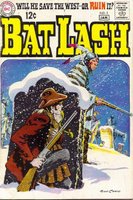Here's the finale to that story:

Somewhat similar sentiments were expressed at the end of the Tiger Man story from Batman #93, which the GCD attributes to Hamilton:

This respect for the past is something of a rarity in comics. It also popped up in the Batman story in Detective #220, which the GCD tentatively credits to Bill Finger, but which I assume also came from Hamilton:







3 comments:
Pat:
I was intrigued by your comment that "respect for the past is something of a rarity in comics." I wonder if you might elaborate on that? It's true that countless stories from the Silver Age looked ahead to a future of scientific advancement, material prosperity, and social progress. But I'm not sure that went hand-in-hand with disrespect for the past.
There's a panel from the Superboy story you referenced in your previous post that's always stuck in my mind. Posing as Clark Kent, the young runaway attends classes at Smallville High School. He becomes interested in the history lesson and curious to learn more. This is part of his eventual reformation.
Respect for education and book learning was a regular motif in Silver Age comics. Teachers were always presented in a positive light, and there were many stories in which dropouts were persuaded to return to school, or lazy, dishonest, or unmotivated students were taught the error of their ways. To some extent, I suppose this was part of the general respect for authority that the Comics Code Authority expected comics to uphold, but I think that it reflected the sincere attitude of many writers and editors. Gardner Fox. for example, frequently drew upon his knowledge of history, most notably in the "Time Pool" stories he wrote for The Atom.
This might be an interesting topic for a future post.
Jim
Thanks for the comment, Jim. What I'm trying to say is not that there was disrespect for the past, it's just that it was seldom celebrated in the stories as something that made us who we are today. It's an unusual ending, unusual enough that I feel confident in ascribing all three stories to the same writer.
The past was more likely to be perceived as something we had gotten through to reach our current advanced state, with a general understanding that the future would be even better. Weisinger and Schwartz were big believers in science and progress for obvious reasons.
Post a Comment